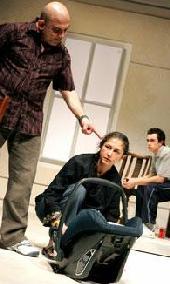SITE GUIDE
SEARCH
REVIEWS
FEATURES
NEWS
Etcetera and
Short Term Listings
LISTINGS
Broadway
Off-Broadway
NYC Restaurants
BOOKS and CDs
OTHER PLACES
Berkshires
London
California
New Jersey
DC
Philadelphia
Elsewhere
QUOTES
TKTS
PLAYWRIGHTS' ALBUMS
LETTERS TO EDITOR
FILM
LINKS
MISCELLANEOUS
Free Updates
Masthead
Writing for Us
A CurtainUp  London Review
London Review
 London Review
London ReviewThe War Next Door
|
Violence is what happens when language fails.
---- Soph |

Jonathan Coyne as Ali, Badria Timimi as Hana and Sonny Muslim as Bobby
(Photo: Tristram Kenton) |
The dichotomy for the English couple is what to do about Ali. The opening scene is very funny as Max fends off Ali's verbal attack on Max's wife sun bathing naked in their garden. Ali is offended by the sight of the naked woman, "She's not just lying there, she's got her legs up over her head." Max maintains that they can do what they like in their own garden. He tries to find some common ground with Ali, offering him a home grown joint (as if to underline the point that Max can do what he likes in his own garden) and the dope relaxes the men. Soph comes in from the garden and offers Ali's wife a job cleaning for them - well intentioned maybe, but patronising and insensitive none the less — but Hana accepts the job which brings the two women together.
The couple hear Ali hitting his pregnant wife next door, her screams, his blows, and they discuss what to do. Max tries to understand where Ali is coming from, why he is behaving like this. Max confronts Ali about his wife beating and finds out that Ali has been selling dope grown from the plants that Max gave him for his own use. This is an implicit threat to Max's profession in the law. After the birth of her baby, we see Hana being hit by her husband and her stepson and she takes the baby and runs next door for refuge. Frightened by what Ali will do on his return, Max offers to stay that night with Hana with disastrous consequences which I shall not reveal here.
The political message is this: Soph and Max are responsible, free thinking professionals. They care about the planet, about global warming, they will make efforts to reduce their carbon footprint. They may know what to do on a global scale but they are confused by the much smaller predicament next door. Max tries to find culturally based excuses for Ali's behaviour, Soph feels that it is intolerable. Tamsin Oglesby's point may be that in our multi-cultural, multi-faith society, in an effort to be tolerant, are we accepting behaviour from other cultures or religions which is against our values and societal laws? The recent debates on the position of women in Islam is one such issue. You will remember the shocking scene in Zorba the Greek where in a remote the widow is stoned to death for having sexual relations with a man. Another interpretation is that the play is an allegory for the Iraq war. Ali is Saddam Hussein and the simplistic question is, "Should we intervene in other nations or other households to stop violence?" If we do, can we handle the consequences?
The performances are thoroughly competent and believable. Jonathan Coyne is especially sinister as the brutish Ali. It is a shame that his part is so without sympathy as it becomes rather one sided and obvious in a dramatic context. I prefer to believe that everyone has a redeeming characteristic. His son Bobby says nothing but uses an air rifle to shoot pigeons and wild birds in between scenes, assuring everyone that Ali's son will be just as violent as he is, if not more so. Tasmin Oglesby has inserted one racist remark into every speaking character's part, Soph bewails the "snotty little Pollack" cleaner who let her down, Hana berates the black bus driver with an offensive racist term, Ali condemns the Greeks and eventually Max loses his temper and calls Ali a "stupid, backward, third world cunt". Each of these remarks shock and serve to remind that when annoyed, a racist comment can be like a knee jerk reaction, even for the middle class Liberal.
As a dramatic piece, The War Next Door doesn't seem to do more than to describe the liberals' impotence. The allegory with Iraq is limited in its effectiveness but Tamsin Oglesby's play highlights the difficulty of issues of domestic violence.
|
THE WAR NEXT DOOR
Written by Tamsin Oglesby Directed by Nicolas Kent With: Lorraine Burroughs, Jonathan Coyne, David Michaels, Sonny Muslim, Badria Timimi Design: Libby Watson Lighting: Lucy Carter Sound: Adam Cork Running time: 75 minutes with no interval Box Office: 020 7328 1000 Booking to 3 March 2007 Reviewed by Lizzie Loveridge based on 6th February 2007 performance at the Tricycle Theatre, Kilburn High Road, London NW6 (Tube: Kilburn) |
|
London Theatre Tickets Lion King Tickets Billy Elliot Tickets Mary Poppins Tickets Mamma Mia Tickets We Will Rock You Tickets Theatre Tickets |




